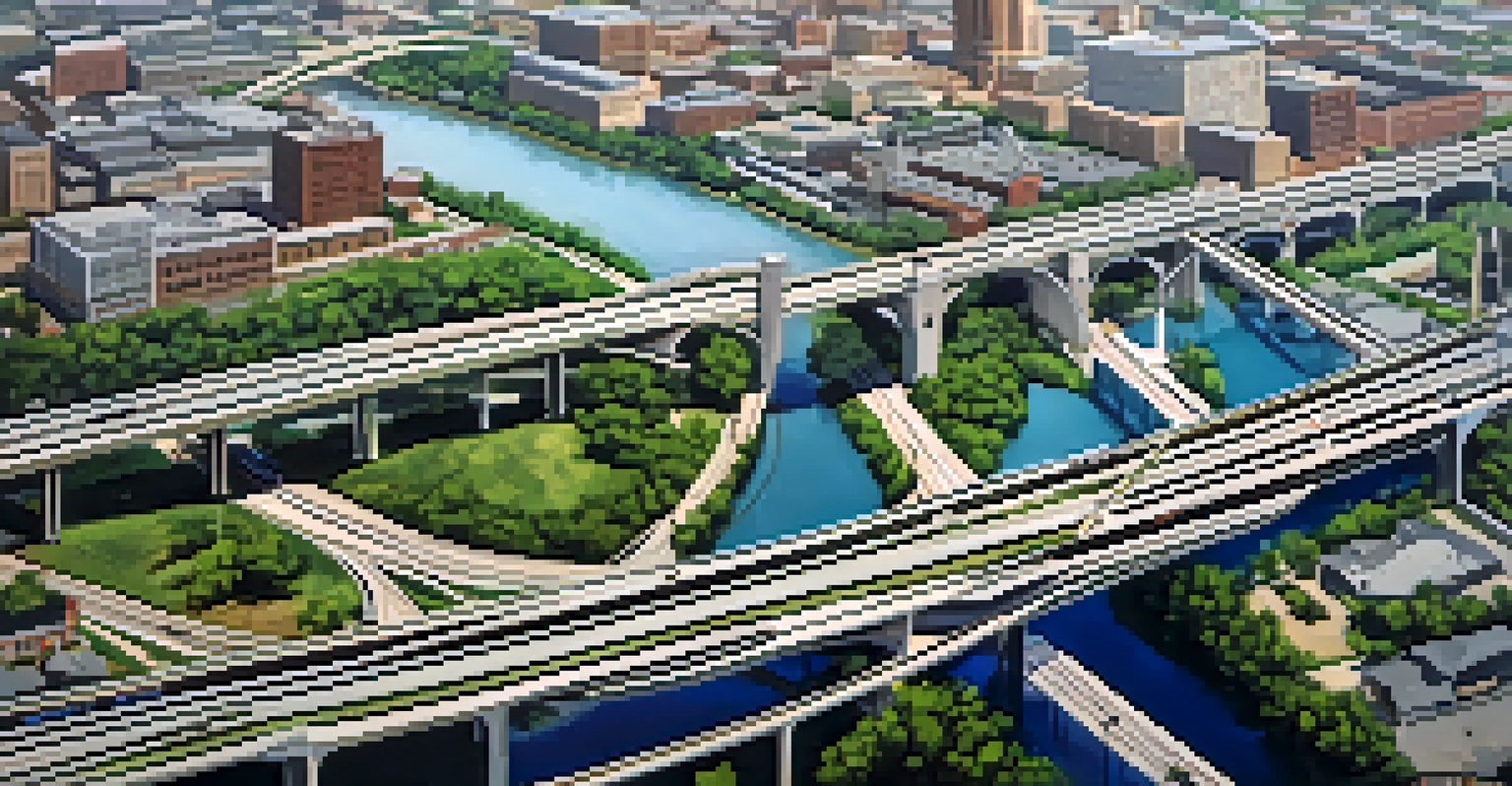Major Political Issues Currently Facing Missouri Residents

The Ongoing Debate Over Healthcare Access in Missouri
Healthcare access remains a pivotal issue for many Missouri residents. With the rising costs of medical services and prescription drugs, many individuals find it increasingly difficult to afford necessary care. This situation is exacerbated by the ongoing discussions around Medicaid expansion, which could potentially provide coverage for thousands of uninsured Missourians.
Of all the forms of inequality, injustice in health is the most shocking and inhuman.
The state has seen divided opinions on the expansion, with supporters arguing it would improve health outcomes and reduce costs in the long run. However, opponents often raise concerns about the financial implications on the state budget. As these debates continue, the impact on residents’ health and finances is profound, highlighting the urgent need for a solution.
Moreover, the COVID-19 pandemic has further exposed the vulnerabilities in Missouri's healthcare system. Many families are now questioning the adequacy of local healthcare services as they deal with long-term health consequences. Ultimately, addressing healthcare access is crucial for the well-being of Missourians.
Education Funding Challenges and Reforms in Missouri
Education funding is at the forefront of political discussions in Missouri. Many public schools are grappling with tight budgets, which affects everything from teacher salaries to classroom resources. This funding gap has raised concerns about educational equity, especially in low-income areas where resources are already limited.

Reform advocates argue that a more equitable distribution of funds is essential for providing all students with quality education. They point to the significant disparities between wealthy and underfunded districts as a reason for urgent reforms. On the other hand, some policymakers argue for the need to prioritize tax cuts and fiscal conservatism, complicating the path to increased funding.
Healthcare Access Remains Critical
Missouri residents face significant challenges affording necessary medical care, highlighting the urgent need for solutions like Medicaid expansion.
As Missouri navigates these challenges, the outcomes will significantly impact future generations. The push for reform could mean the difference between a well-prepared workforce and a struggling one, emphasizing the importance of education as a political priority.
Rising Crime Rates and Public Safety Concerns
Crime rates in Missouri have become a notable concern for residents and lawmakers alike. Cities like St. Louis and Kansas City have experienced spikes in violent crime, leading to fears about safety in neighborhoods. This uptick has prompted discussions about how best to combat crime while ensuring that community relations with law enforcement remain strong.
Education is the most powerful weapon which you can use to change the world.
Many residents advocate for a balanced approach that includes both increasing police funding and investing in community programs. These programs could provide youth with alternatives to crime, such as education and job training opportunities. However, there is also a call for police reform to address systemic issues and build trust within communities.
The challenge lies in finding effective solutions that prioritize public safety while fostering community engagement. As these discussions evolve, the outcomes will have lasting effects on how residents perceive safety and the role of law enforcement in their lives.
Economic Recovery and Job Opportunities Post-Pandemic
The economic recovery from the COVID-19 pandemic is a pressing issue for Missouri residents. Many businesses faced closures, and unemployment rates soared during the height of the crisis. As the state begins to rebound, the focus is on creating job opportunities and supporting local economies to ensure a sustainable recovery.
Government initiatives aimed at stimulating job growth are underway, but challenges remain. Many workers are still hesitant to return to the workforce due to health concerns, childcare issues, or lack of competitive wages. This creates a complex landscape where businesses are eager to hire, but potential employees are wary.
Education Funding Disparities Persist
Ongoing political debates about education funding reveal deep inequities between wealthy and underfunded districts, emphasizing the need for reform.
Additionally, the shift towards remote work has changed the job market dynamics. Missouri must adapt by offering training and resources that align with the evolving needs of both employers and job seekers. As the state navigates this recovery, the emphasis on collaboration between the public and private sectors will be crucial.
Infrastructure Improvements and Transportation Needs
Missouri's infrastructure, particularly transportation systems, is in dire need of attention. Aging roads and bridges pose safety risks for drivers and hinder economic growth. As residents encounter daily frustrations with traffic and poor road conditions, the urgency for infrastructure investment has become a top political priority.
State leaders are debating funding sources for necessary improvements, such as increased fuel taxes or federal grants. While some residents support these measures, others are concerned about the financial burden they might impose. The challenge lies in finding a balance that addresses immediate infrastructure needs while considering long-term fiscal responsibility.
Moreover, the push for sustainable transportation options, like public transit and cycling infrastructure, is gaining traction. As Missouri looks to modernize its transportation landscape, integrating sustainability could help enhance both mobility and environmental responsibility.
Racial Inequality and Social Justice Movements
Racial inequality remains a significant issue in Missouri, drawing attention to the need for social justice reforms. Recent movements advocating for racial equity have sparked important conversations around systemic racism in various sectors, including law enforcement, education, and healthcare. Residents are increasingly demanding accountability and changes to longstanding practices that perpetuate inequality.
These discussions have led to protests and community engagement efforts aimed at creating awareness and prompting legislative action. Many Missourians are calling for changes to policies that disproportionately affect marginalized communities, such as bail reform and police accountability measures. The challenge is ensuring that these voices are heard in the political arena.
Racial Inequality Demands Attention
Movements advocating for racial equity in Missouri are prompting essential discussions about systemic racism and the need for social justice reforms.
Addressing racial inequality is not only a moral imperative but also a necessary step toward building a more inclusive society. As Missouri grapples with these issues, the outcomes will shape the state's social fabric for years to come.
Environmental Concerns and Climate Change Initiatives
Environmental issues, particularly those related to climate change, are increasingly important to Missouri residents. From extreme weather events to water quality concerns, the effects of climate change are felt directly in many communities. This has prompted calls for action to protect natural resources and promote sustainable practices.
Local activists are advocating for more stringent environmental regulations and greater investment in renewable energy sources. While some policymakers support these initiatives, others express concerns about the economic implications, particularly for industries reliant on traditional energy sources. This tension creates a challenging environment for environmental policy development.

Ultimately, addressing environmental concerns requires collaboration between various stakeholders, including government, businesses, and residents. As Missouri moves forward, the commitment to sustainability could play a vital role in safeguarding the state’s future.
Voting Rights and Election Integrity Discussions
Voting rights and election integrity have become hot-button issues in Missouri, as they have across the country. Recent legislation aimed at tightening voting regulations has sparked debate among residents and lawmakers. Advocates for voting rights argue that these measures disproportionately affect marginalized communities and could hinder voter participation.
On the flip side, supporters of stricter regulations believe they are necessary to prevent fraud and ensure the integrity of elections. This has led to a polarized environment where discussions about voting often devolve into partisan clashes. The challenge is finding common ground that protects both the accessibility of voting and the integrity of the electoral process.
As Missouri prepares for upcoming elections, the focus on voting rights will continue to be a pivotal issue. Ensuring that all residents have a voice in the democratic process is essential for a healthy democracy, making this a critical topic for ongoing political discourse.